You are here
- Home
- Net Zero & Digital Transformation
- Accelerating Ambition and Impact: EAUC Conference 2024
Accelerating Ambition and Impact: EAUC Conference 2024
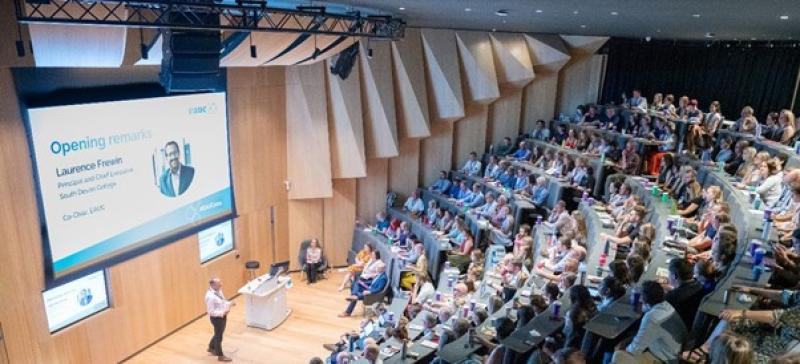
The EAUC (Environmental Association for Universities and Colleges) conference, held in Winchester from 24-25 July 2024, brought together more than 230 attendees, including 81 presenters and 20 exhibitors, under the theme "Accelerating Ambition and Impact." The conference celebrated its 20th anniversary and this year there was a distinct sense that action had to be taken. The opening remarks by Laurence Frewin, Principal and CEO of South Devon College, and Gavin Hunter, Chief Operating Officer of the University of Winchester, set an optimistic tone. With Charlotte Bonner, CEO of EAUC, highlighting the organisation’s new strategy, reinforcing EAUC's commitment to driving sustainability in education.
The messages this year were clear, "embodying not embedding" sustainability in practice and emphasising that sustainability should serve as the umbrella for Equality, Diversity, and Inclusion (EDI) initiatives, rather than being an add-on. Messages that both build on the founding principles of The Open University.
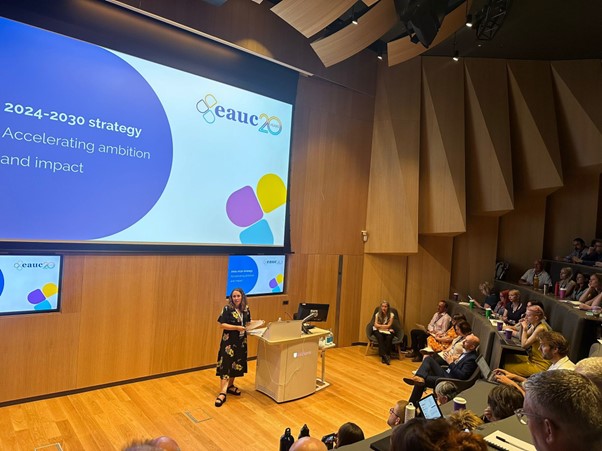
Keynote Address: Creativity, Engagement, and Climate Change
Judy Ling Wong, Honorary President of the Black Environment Network, delivered an inspiring keynote on engaging urban populations—80% of whom live in urban areas—with nature and green infrastructure. She emphasised transforming streets and fostering community engagement to build sustainable cities. Ms Wong highlighted the quote by the British historian and activist Robert Swan "The greatest threat to our planet is the belief that someone else will save it," urging collective action and institutional accountability.
Whole Organisation Approaches
Simon Kemp from the University of Southampton discussed the importance of involving all stakeholders, particularly students, in sustainability initiatives. He shared insights on evaluating university modules against the Sustainable Development Goals (SDGs) and the effectiveness of annual reports in reinforcing sustainability strategies. Kemp stressed the need for cultural change and creating a community of sustainability champions.
Pathways to Net Zero
Amy Wiskar led a session on developing pathways to Net Zero, emphasising the importance of aligning financial strategies with sustainability commitments. Mark Wilkinson from Imperial College shared its decarbonisation plan, highlighting the use of their carbon budget calculator (I-C-Calc), which helps institutions track emissions and develop cost-effective Net Zero strategies.
Connecting ESD and Green Skills
Paul Astles and Catriona Matthews from The Open University discussed breaking down silos and connecting Education for Sustainable Development (ESD) with green skills. Their interactive session resulted in a vibrant exchange of ideas, emphasising the importance of collaboration and awareness.
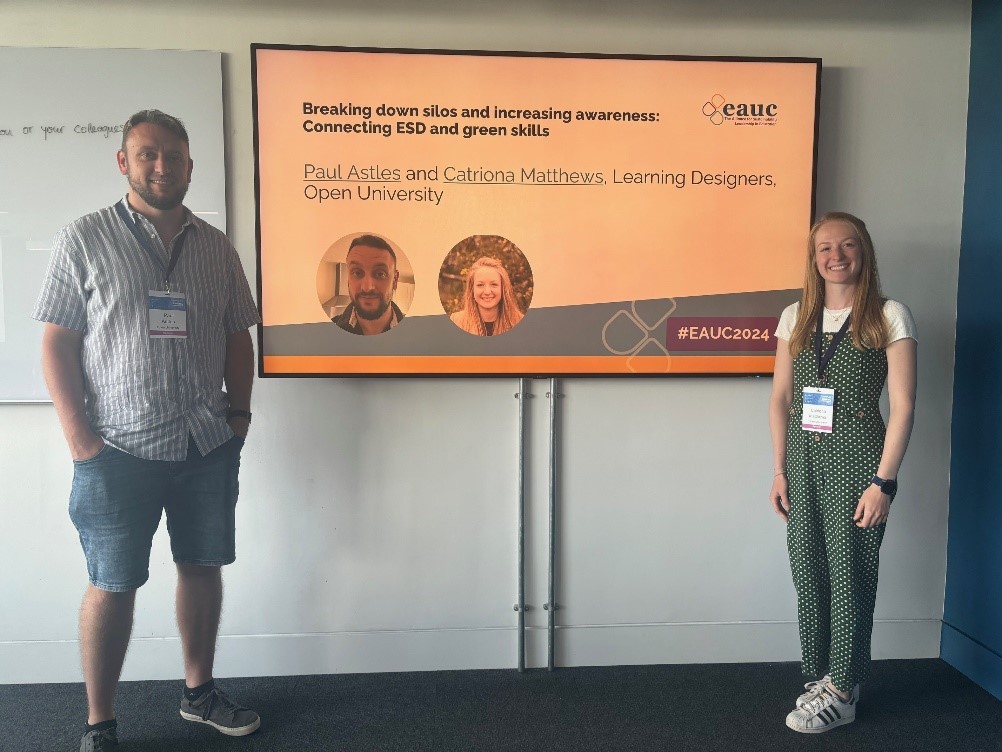
Biodiversity Net Gain and Tools
Tracey Hannon explored tools and strategies for achieving Biodiversity Net Gain (BNG), including the Biodiversity Metric and various assessment apps. She highlighted the significance of green and blue infrastructure in enhancing biodiversity.
Engaging Senior Management
Engaging senior management was a key theme, with speakers including Prof. Eunice Simmons and Prof. Neil Glasser stressing the importance of aligning sustainability with institutional goals and securing buy-in from finance directors. They advocated for Carbon Literacy training for leaders to foster a deeper commitment to sustainability.
Risk and Adaptation
A plenary session on risk and adaptation, hosted by Professor Zoe Robinson, discussed integrating climate risks into institutional strategies. Panellists from various universities shared their experiences in managing climate impacts, emphasising the need for robust data and collaboration with insurers.
AI and the Future of Sustainability
A discussion panel on AI explored its potential to streamline sustainability efforts. Speakers highlighted both the opportunities and challenges of using AI in education, stressing the need for ethical considerations and robust data security measures.
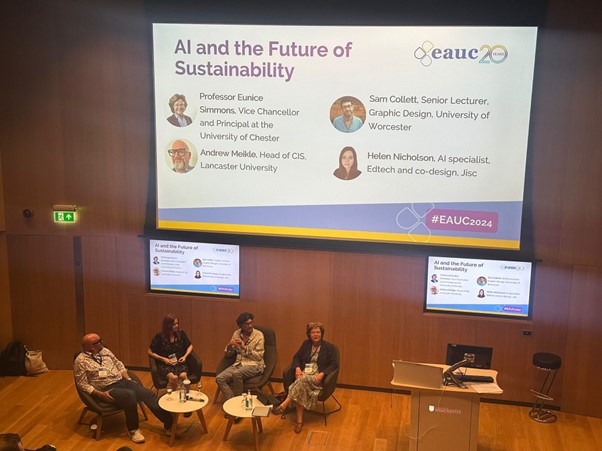
Beyond the Classroom: ESD through collaboration and whole
institution approaches
The session on ESD (Education through Sustainable Development) through collaboration underscored the importance of involving the entire institution, from students to senior leaders, in sustainability efforts. Creative initiatives like Barnsley College's "sustainability voice" and York St John University's "living lab" were showcased as exemplary models of inclusive and effective sustainability practices.
Is Activism a Dirty Word?
A lively debate on the role of activism in sustainability education concluded that activism, in its various forms, is essential for driving change. Participants discussed the importance of eco-anxiety as a motivator and the need for inclusive, community-driven actions.
Coping with Complexity and Paradoxes in Education
Paul Griffiths and Catriona Matthews discussed the complexity of sustainability in education, introducing the paradox model as a tool for critical thinking. They emphasised the importance of industry knowledge and reflective practice in empowering educators and students alike.
Higher Education Institutions and the Circular Economy
The circular economy was another focal point, with discussions on promoting reuse, responsible procurement, and reducing waste. Attendees explored ways to integrate circular economy principles into campus operations and foster cultural change.
Sharing ideas and best practice – Travel Policies
The revision of travel policies was a key area for both Manchester and Oxford Universities. Oxford University presented its Sustainable Travel Policy which has streamlined the process of travel booking and introduced a new flight levy. Three rates were outlined £30, £50 and £70 per TCO2e. The Policy/Levy will be reviewed in two years. The policy also stated a desire to reduce the environmental impact of travel. Oxford is carefully balancing value for money with cost, quality, risk and environmental impact with all requests and restricted domestic flights.
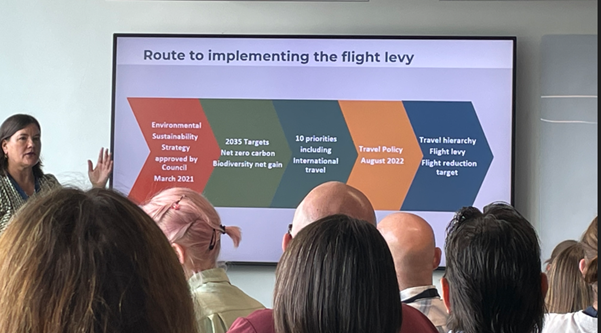
Conclusion: Positivity, Passion, and Purpose
The conference concluded with a focus on Positivity, Passion, and Purpose, encouraging attendees to embrace mindfulness and gratitude as tools for sustaining their environmental efforts. This year’s EAUC conference not only accelerated ambition but also showcased practical strategies for making a lasting impact in higher education sustainability.
As the discussions came to a close, the resounding message was clear: embodying sustainability in our practices is not just a necessity but an opportunity to create a resilient, inclusive, and thriving future for all.
Related articles
- Reducing your carbon footprint this Festive Season 28th October 2024
- Accelerating Ambition and Impact: EAUC Conference 2024 30th July 2024
- Driving change: Imagining a different transport future 23rd July 2024
- Donating items to MK Food Bank 21st July 2024
- Butterflies as indicators of our impacts on nature - Climate Perspectives 9th July 2024